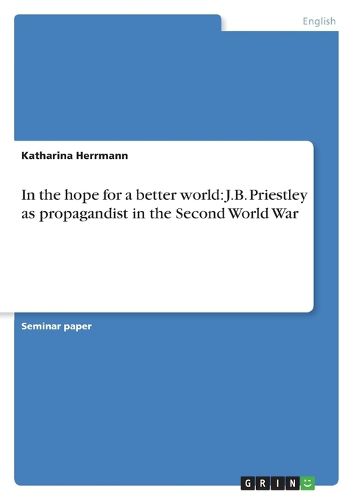Readings Newsletter
Become a Readings Member to make your shopping experience even easier.
Sign in or sign up for free!
You’re not far away from qualifying for FREE standard shipping within Australia
You’ve qualified for FREE standard shipping within Australia
The cart is loading…






Seminar paper from the year 2008 in the subject English Language and Literature Studies - Literature, grade: 1, University of Heidelberg (Anglistisches Seminar), course: J.B. Priestley: Dramatist, Novelist, Essayist and Social Critic, language: English, abstract: Having served as a soldier in the First World War, Priestley knew about the importance of the maintenance of Home Front morale in times of war. J.B. Priestley was a very skilful broadcaster who knew how to create a foundation of trust between himself and his audience, namely by identifying with the ordinary British population, and by letting them take part in his own life and experiences. He managed to maintain the morale of his compatriots by glorifying them in their ordinariness and by juxtaposing their naturalness, courage and their ability not to let the war get them down to the soulnessness of the German military machine, devoid of all human feeling. Through his criticism and verbal attacks on the Nazis, Priestley surely might have won recognition on the part of the Churchill government but the fact that he openly expressed his views about the necessity of a fundamental reconstruction of the society after the end of the War, which was mostly connected to his liberal socialist ideals, nevertheless made him fall out of favour with the government since it refused to commit itself to any post-war programmes. As a consequence of the ongoing quarrel with leading officials of the BBC and the Ministry of Information, Priestley was forced to quit his Postscripts in March 1941 and refused to accept the offer of returning to microphone some weeks or months later. Priestley even accused the BBC and the Ministry of being a political Gestapo . Although Priestley is very critical about his Postscripts in his autobiography Margin Released (1962), one single sentence perhaps resumes best his role during the blitzkrieg: To this day middle-aged and elderly men shake my hand and tell me what a ten-minute talk about duck
$9.00 standard shipping within Australia
FREE standard shipping within Australia for orders over $100.00
Express & International shipping calculated at checkout
Seminar paper from the year 2008 in the subject English Language and Literature Studies - Literature, grade: 1, University of Heidelberg (Anglistisches Seminar), course: J.B. Priestley: Dramatist, Novelist, Essayist and Social Critic, language: English, abstract: Having served as a soldier in the First World War, Priestley knew about the importance of the maintenance of Home Front morale in times of war. J.B. Priestley was a very skilful broadcaster who knew how to create a foundation of trust between himself and his audience, namely by identifying with the ordinary British population, and by letting them take part in his own life and experiences. He managed to maintain the morale of his compatriots by glorifying them in their ordinariness and by juxtaposing their naturalness, courage and their ability not to let the war get them down to the soulnessness of the German military machine, devoid of all human feeling. Through his criticism and verbal attacks on the Nazis, Priestley surely might have won recognition on the part of the Churchill government but the fact that he openly expressed his views about the necessity of a fundamental reconstruction of the society after the end of the War, which was mostly connected to his liberal socialist ideals, nevertheless made him fall out of favour with the government since it refused to commit itself to any post-war programmes. As a consequence of the ongoing quarrel with leading officials of the BBC and the Ministry of Information, Priestley was forced to quit his Postscripts in March 1941 and refused to accept the offer of returning to microphone some weeks or months later. Priestley even accused the BBC and the Ministry of being a political Gestapo . Although Priestley is very critical about his Postscripts in his autobiography Margin Released (1962), one single sentence perhaps resumes best his role during the blitzkrieg: To this day middle-aged and elderly men shake my hand and tell me what a ten-minute talk about duck